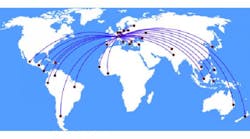President Donald Trump’s new tariffs are helping to erode China’s appeal as a place where stuff gets made.
Ricoh Co. is moving some manufacturing from China to Thailand to avoid potential risks from the U.S.-China trade tensions, the Japanese office-equipment maker said on May 16. That came hours after a report that Taiwan’s Kenda Rubber Industrial is investing in Vietnam to do the same.
Those two examples are just the most recent from a chorus of executives who are citing the trade war as the final straw in their shift out of China, with margins already squeezed by rising labor costs, tougher environmental standards and domestic competition. Last week Trump hiked tariffs on $200 billion of Chinese imports and the U.S. is readying the expansion of that treatment to the remainder.
“The purpose is to minimize the impact of tariff increases,” Ricoh said in a statement, referring to the newly announced U.S. tariffs on the rest of imports from China. The firm will produce all U.S.-bound multi-function printers in Thailand instead of Shenzhen in southern China.
The company said it will consider various changes to its production structure including moving more production to Thailand from China, to “respond to various risks and improve efficiency,” it said.
Big consumer brands Samsonite International SA, Macy’s Inc. and Fossil Group Inc. have all said on recent calls with analysts that they are continuing to move production and sourcing out of China.
“We’re generally under an initiative to kind of shift what we can from China, which we were doing even ahead of tariffs,” Samsonite CEO Kyle Gendreau said on May 13. “And we’re just continuing to accelerate on the mix of what’s coming from China to kind of mitigate the impacts there as well.”
The threatened tariffs of 25% on all exports to the U.S., which accounts for a fifth of China’s total outbound shipments, are set to give China the stiffest test of its role as the core of the global supply chain. For Cisco Systems Inc., shipping from other nations is the way to go.
“We still have some manufacturing happening in China, but we have greatly, greatly reduced our exposure working with our supply chain and our suppliers,” Chief Financial Officer Kelly A. Kramer said on a call with analysts Wednesday, when asked about the impact of the tariffs. “So the impact that we’re expecting, again we are trying to mitigate.”
Retailing giant Walmart Inc., whose clout with suppliers gives it some room to maneuver, indicated that shoppers will absorb some of the costs of higher levies.
“We will do everything we can to keep prices low, but increased tariffs lead to increased prices,” CFO Brett Biggs said. He added that finding alternative manufacturers “is one of a number of actions that our merchants are considering.”
Some businesses have already moved following last year’s tariffs on the first batch of Chinese products. Communication equipment producer Sierra Wireless Inc. has almost completed moving some production to Vietnam, and that has reduced the firm’s exposure to further trade flaring, CFO David McLennan said on May 9.
UBS Group AG found in a November survey that around 37% of 200 export manufacturers said that they had transferred production in the past year, while another 33% plan to do so in the next six to 12 months. That relocation comes at a cost for companies such as aluminum producer Granges AB, which had to move production out of its most cost-efficient facility in China to a plant in Sweden.
Even Chinese firms are moving to dodge the tariffs. China-based Jason Furniture (Hangzhou) Co. revealed plans to build factories overseas in its annual report last month, and Xilinmen Furniture Co. started to build a production base in Thailand.
While Chinese exporters reel at the escalating tensions, other countries and businesses are extending invitations to those driven out of the Asian nation.
If the trade war between the U.S. and China continues it opens “a door for South America to occupy this space,” Fernando Queiroz, Chief Executive Officer of the Sao Paulo-based meat producer Minerva SA, said.



